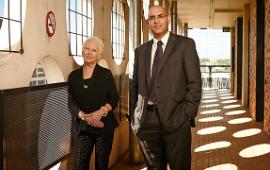Swinburne students make digital stories for aged-cared residents

In Summary
This article originally featured in Swinburne’s Venture magazine
Each year, a special connection is forged in aged-care facilities across Melbourne.
Twelve psychology students from Swinburne, usually aged in their 20s, are paired with aged-care residents, whom they visit weekly or fortnightly.
Sunil Bhar, Associate Professor of Psychology at Swinburne, helped establish the project almost three years ago. He says students must commit to spending one year with their resident and produce a three-minute digital story at the end of the year. The story highlights the life of the resident based on images and information they have provided.
“It’s kind of like the show, This is Your Life, but it goes for three minutes,” Associate Professor Bhar says.
“It’s about showing the true essence of the individual and what has been important in their lives.
“The stories also become a frame for a deeper friendship that occurs between the resident and the student, and many students continue the friendships after they have made the digital story.”
Associate Professor Bhar, and his colleagues, Rebecca Collins and Mark Silver, run the program through the Wellbeing Clinic for Older Adults, a counselling service established seven years ago. The digital storytelling project was developed in response to resident feedback.
“Some residents did not need counselling – they just needed a friend to talk to,” he says.
“Older people often don’t want to spend time with just older people, and even though there is an age gap, they always find something in common with the younger students.
“The digital storytelling format gives the friendship between the student and the resident a structure, a place to start,” he says.
“Furthermore, a lot of staff in aged-care facilities do not have English as their first language so a digital story is much more feasible for them to watch and it gives them an insight into the residents in their care.”
Associate Professor Bhar says the program will be expanded next year to include volunteers from the general community, as well as university students.

